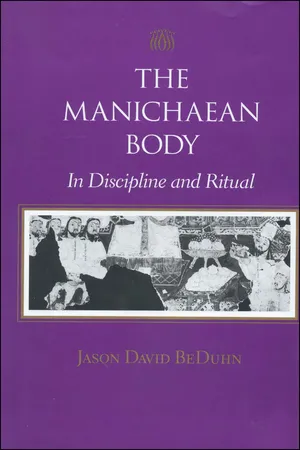
- English
- ePUB (mobile friendly)
- Available on iOS & Android
About this book
Award for the Best First Book in the History of Religions from the American Academy of Religion
Reconstructing Manichaeism from scraps of ancient texts and the ungenerous polemic of its enemies (such as the ex-Manichaean Augustine of Hippo), BeDuhn reveals for the first time the religion as it was actually practiced. He describes the Manichaeans' daily ritual meal, their stringent disciplinary codes (intended to prevent humans from harming plants and animals), and their secretive religious procedures designed to transform the cosmos and bring about the salvation of all living beings.
Overturning long-held assumptions about Manichaean dualism, asceticism, spirituality, and the pursuit of salvation, The Manichaean Body changes completely how we look at this ancient religion and the environment in which Christianity arose. BeDuhn's conclusions revolutionize our understanding of the Manichaeans, clearly distinguishing them from Gnostics and other early Christian heretics and revealing them to be practitioners of a unique world religion.
Frequently asked questions
- Essential is ideal for learners and professionals who enjoy exploring a wide range of subjects. Access the Essential Library with 800,000+ trusted titles and best-sellers across business, personal growth, and the humanities. Includes unlimited reading time and Standard Read Aloud voice.
- Complete: Perfect for advanced learners and researchers needing full, unrestricted access. Unlock 1.4M+ books across hundreds of subjects, including academic and specialized titles. The Complete Plan also includes advanced features like Premium Read Aloud and Research Assistant.
Please note we cannot support devices running on iOS 13 and Android 7 or earlier. Learn more about using the app.
Information
Table of contents
- Cover Page
- Title Page
- Copyright Page
- Dedication
- Contents
- Preface
- Acknowledgments
- Note On Texts And Transliterations
- 1. Out of the Past
- 2. Disciplinary Regimens
- 3. Disciplinary Rationales
- 4. Alimentary Rites
- 5. Alimentary Rationales
- 6. The Liberation of the Embodied Self
- 7. “Ein Etwas am Leibe”
- Table of Textual References
- Notes
- Bibliography
- Index